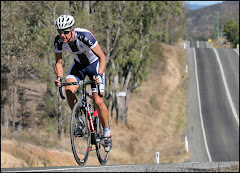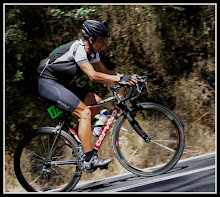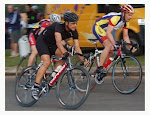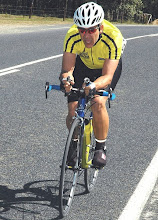Training Programs
Just over a week ago, I wrote something on building a training program. Now, I would like to explain some of those points in a slightly more detailed manner. It is all based on my own experiences so feel free to comment.
Rider’s Experience is the first point I would want to look at when choosing a program. Novice riders, experienced riders, male and female riders, junior and master riders and all the possible combinations require and should have different programs. Not stating anything new here but it is important to remember that we all have our defining features, as groups or as individuals.
Starting with beginners (any age), I don’t think this group should worry about a training program at all. It is a time to discover cycling as a sport and to learn what we all like about it. It is time to meet other riders, start doing bunch rides, learn about the equipment and to start racing.
It is time to have fun. When the real training starts later, some of it won't be too much fun...
More experienced riders, let’s say with a year or more of saddle time, should have a better understanding of the sport and should have a better idea of their needs (as in need to improve) and wants. At this level, bunch riding should be easy and correct race grade found.
Here, a training program can be introduced, preferably a program which will work on long base miles to start with. I heard a lot of people saying that we need to have those long miles in the legs from the beginning. Also, that it takes two or three years to build those legs and engines to achieve maximum results. In a way, that’s how it worked for me.
I am not going to write much about junior riders because I believe it is group that needs a specialised methodology due to the demands of the sport and affects on their general development. I would say, go out there and have fun or get a coach who has the know-how.
Now, the Masters. I could talk about those a bit… If the rider isn’t a beginner, it is likely that he/she is coming from another sport. That helps but as age comes into it so does a number of other things. Some positive, like a good knowledge of how we can push that engine of ours. Some not so positive, like the history of injuries and a slower recovery rate.
Great time to have a training program. Particularly if racing hard for a whole season or entering a big event of some kind is the goal. And aiming to win a couple in the process…
A program including more specifics and lots of recovery time might be ideal for those who are also likely to have a little less time because of work and/or family commitments. Some do prophecy that less miles and more time in the gym can be good for “us”, too.
Then, we can go to female and male riders. I would dare to say that they are also very distinctive areas. There are some specifics on the training of the two groups and choosing programs and coaches should take them in consideration.
There are many books on training programs and the good ones have specific chapters on the groups and sub-groups. Buy a couple of those. Cycling clubs have “club coaches”; try to find one that is actively involved with the sport.
One last point, some of us will respond differently to certain training programs, it is important to experiment to find out what works best and that might take time.
Rider’s Experience is the first point I would want to look at when choosing a program. Novice riders, experienced riders, male and female riders, junior and master riders and all the possible combinations require and should have different programs. Not stating anything new here but it is important to remember that we all have our defining features, as groups or as individuals.
Starting with beginners (any age), I don’t think this group should worry about a training program at all. It is a time to discover cycling as a sport and to learn what we all like about it. It is time to meet other riders, start doing bunch rides, learn about the equipment and to start racing.
It is time to have fun. When the real training starts later, some of it won't be too much fun...
More experienced riders, let’s say with a year or more of saddle time, should have a better understanding of the sport and should have a better idea of their needs (as in need to improve) and wants. At this level, bunch riding should be easy and correct race grade found.
Here, a training program can be introduced, preferably a program which will work on long base miles to start with. I heard a lot of people saying that we need to have those long miles in the legs from the beginning. Also, that it takes two or three years to build those legs and engines to achieve maximum results. In a way, that’s how it worked for me.
I am not going to write much about junior riders because I believe it is group that needs a specialised methodology due to the demands of the sport and affects on their general development. I would say, go out there and have fun or get a coach who has the know-how.
Now, the Masters. I could talk about those a bit… If the rider isn’t a beginner, it is likely that he/she is coming from another sport. That helps but as age comes into it so does a number of other things. Some positive, like a good knowledge of how we can push that engine of ours. Some not so positive, like the history of injuries and a slower recovery rate.
Great time to have a training program. Particularly if racing hard for a whole season or entering a big event of some kind is the goal. And aiming to win a couple in the process…
A program including more specifics and lots of recovery time might be ideal for those who are also likely to have a little less time because of work and/or family commitments. Some do prophecy that less miles and more time in the gym can be good for “us”, too.
Then, we can go to female and male riders. I would dare to say that they are also very distinctive areas. There are some specifics on the training of the two groups and choosing programs and coaches should take them in consideration.
There are many books on training programs and the good ones have specific chapters on the groups and sub-groups. Buy a couple of those. Cycling clubs have “club coaches”; try to find one that is actively involved with the sport.
One last point, some of us will respond differently to certain training programs, it is important to experiment to find out what works best and that might take time.
Waiting for my training
I haven't been able to train this year, really. I just keep watching my cadence drop (120 rpm)during my high cadence efforts and my heart rate going up. That's enough to make me think that something isn't right and the best thing is to pull back and wait.
The week has been reduced to two sessions on the trainer, that's half of what I was doing. OK, there was Xmas and NY, a third cortesone injection on my shoulder this week and coming up, a little holiday. I might as well relax and wait.
Session #1


Session #2


I am starting to think that I should not call it training anymore, not even a maintenance routine.
Injury Management
That sounds pretty fancy, doesn't it? I am on phase three now, meaning that I had a third injection of cortisone on my shoulder and have now three to four weeks to pump up the exercises without too much pain. In theory anyway...

The good news? With a bit of luck, I will be back on the bike in three weeks.
Tour Down Under
The biggest cycling event on this land started today. A very fast criterium race took place on the streets of Adelaide and the winner was Robbie McEwen. How amazing is that?

A bit of the McEwen magic
But there is much more to come - TDU info. Unfortunately, I won't be able to post much (or at all) in the next week because I am going to head that way to become a full on spectator. I am hoping to follow the race with Sandra in a camper and make the most of our time in Adelaide to visit a few friends and check the place out as well.
Will have a lot to tell when I get back, meanwhile, Safe Riding!











.jpg)

.jpg)




No comments:
Post a Comment